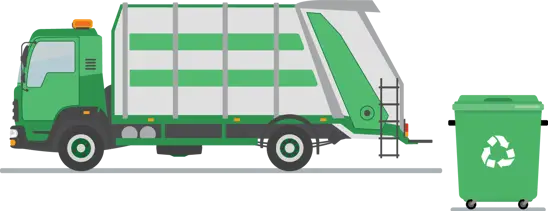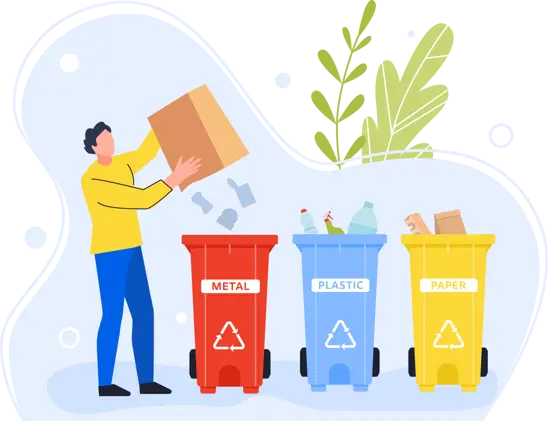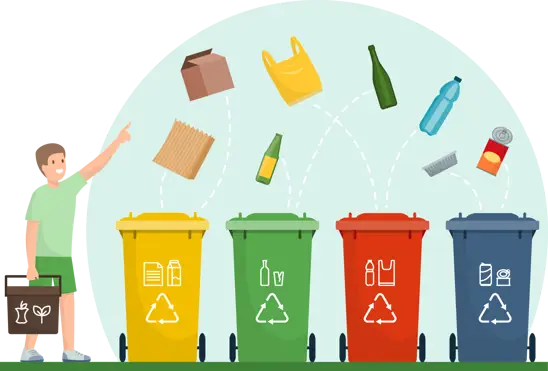
Understanding Waste Management Regulations For Businesses
All businesses are now aware that they must comply with waste management regulations UK-wide to ensure they handle, store, and dispose of waste responsibly.
Failure to comply can lead to businesses incurring fines, prosecution, and reputational damage. Understanding these responsibilities is vital for protecting business interests and meeting legal obligations.

Are You Confident Your Business is Meeting Waste Management Regulations UK?
Key Takeaways:
1. Understanding and complying with waste management regulations UK helps to avoid fines, legal action and reputational damage.
2. Businesses must classify, store and dispose of waste correctly, including hazardous waste materials, while keeping appropriate records such as waste transfer notes.
3. Partnering with a licensed provider like WM101 ensures compliance, sustainability and peace of mind.

What Are Waste Management Regulations in the UK?
Overview of UK Legislation
The waste management regulations UK that businesses must follow are built around the Environmental Protection Act 1990. This clearly sets out a legal duty of care for all waste producers.
The waste hierarchy also plays a key role, requiring businesses to prioritise prevention, reuse, recycling and recovery before disposal. This framework helps to reduce waste sent to landfill and encourages more sustainable practices.
Key Regulations Every Business Should Know
Moving forward, every business must properly classify waste as either hazardous or non-hazardous and ensure it is managed correctly. Waste transfer notes must be kept for every movement of waste, providing an audible trail.
Producers, carriers, and disposers each carry legal responsibilities to use licensed operators and comply with regulations, ensuring waste is handled safely and legally.

Your Legal Duty of Care as a Business
Ensuring Proper Waste Disposal
Businesses have a duty of care to only use licensed waste carriers under the Waste Regulations UK and to keep all relevant waste transfer documentation. This provides proof that waste has been handled legally and protects a business against potential fines and/or penalties.
Storing and Managing Waste On-Site
It is crucial for businesses to ensure that all waste is stored securely before collection. This includes using lockable bins or storage rooms, etc, to prevent leaks, theft and/or pests.
Waste should always be clearly labelled and segregated, for example, with colour-coded bins. Staff should also be trained to handle and segregate waste correctly.

How Regulations Affect Different Types of Waste
General Commercial Waste
Under the Waste Regulations UK, offices, shops and warehouses require separating recyclable materials, storing waste securely, and ensuring it is collected by a licensed carrier. This includes everyday waste such as paper, packaging, and food waste, which must be managed in line with regulations.
Hazardous Waste
Hazardous materials, for example, chemicals, solvents, batteries, or fluorescent tubes are subject to additional controls where businesses must classify, store and dispose of hazardous waste separately and ensure it is collected by authorised carriers and recorded with hazardous waste consignment noes.
Construction & Industrial Waste
Typically, construction and industrial sites generate large volumes of waste. Regulations require Site Waste Management Plans (SWMPs) to outline how materials will be reduced or reused or disposed of to ensure compliance in reducing costs and the environmental impact.

Consequences of Non-Compliance
Fines and Legal Action
Failure to comply with waste management regulations UK can lead to significant financial and legal consequences. For minor breaches, businesses may face fixed penalty fines. Where more serious offences of non-compliance occur, businesses can receive unlimited fines and prosecution. Enforcement notices can be issued in some cases where immediate corrective action. In severe cases directors and business owners may also be held personally liable.
Reputational Damage
Beyond financial penalties, poor waste management can harm a business’ reputation. Clients and customers increasingly expect businesses to operate sustainably, and non-compliance can result in a loss of trust and contracts.

Environmental Impact
Failing to follow waste management UK regulations can have serious environmental consequences. Improper disposal of waste can contaminate soil and waterways which can harm wildlife and damage fragile ecosystems. Hazardous waste such as chemicals and solvents not only pose a risk to animals but also public health where toxins can leach into drinking water supplies and/or create air pollution.
Poor waste management also contributes to higher carbon footprints as materials which could be recycled end up in landfill which increases greenhouse gas emissions.

Steps Your Business Can Take Today
Conduct a Waste Audit
To ensure your business remains compliant with waste management regulations UK it is essential to start with a thorough waste audit. This can help to identify what types of waste you generate and whether all types of waste are being handled correctly.
Review Your Current Waste Contractors
At WM101, we also recommend checking that your contractors are fully licenced and provide the correct documentation. Working with an accredited provider such as WM101 reduces legal risk and improves sustainability.
Educate Staff on Legal Responsibilities
It is essential that your teams are trained to carry out proper segregation, storage and record-keeping. Staff awareness is crucial to maintain compliance in day-to-day activities and to avoid costly mistakes.

Contact WM101 to Discuss your Waste Management Responsibilities
At WM101, we understand the complexities of ensuring compliance with waste management regulations UK businesses face and ensure that we make the process as simple as possible. we provide fully compliant, tailored commercial waste collection services that save time and reduce risk.
What You Get with WM101:
- One month of free bin collections
- Free waste transfer notes
- No bin rental costs
- Certified waste collection backed by ISO 9001 and ISO 14001

Get a Free Quote for Commercial Waste Collection
Contact our team today to get your free quote for commercial waste collection with WM101 and ensure you meet waste management regulations UK.
FAQs About UK Waste Management Regulations
UK businesses must comply with several key regulations, including the Environmental Protection Act 1990 and the Waste Hierarchy. They must classify waste correctly, use licensed carriers, and keep waste transfer notes for at least two years. hazardous waste requires additional controls.
Non-compliance of waste management regulations UK can result in fines, prosecution, loss of reputation and contracts. The Environmental Agency and local authorities can take enforcement action if waste is mishandled. Failing to use licensed carriers or maintain proper documentation may also lead to legal consequences. Working with a compliant provider such as WM101 ensures your business is protected.
01/09/2025